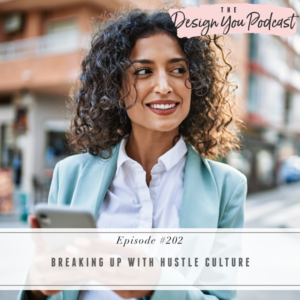
So many of us are still subscribing to hustle culture because it’s all we’ve ever known. We’re all used to doing whatever it takes in the moment to mitigate fear and uncertainty, even if that means overworking at the expense of our wellbeing. But doing this forever will continue to keep us on the hustle bus, so what’s the alternative?
Discomfort is the currency of your dreams, and to break up with hustle culture, we have to be willing to feel the discomfort. If you dream of having a more balanced and sustainable workload and life, it can only be achieved by feeling the discomfort of breaking up with old habits and the behaviors driven by hustle culture.
In this episode, I’m showing you how to stop the hustle and unlearn the laziness lie. Discover the importance of reclaiming the word and concept of “lazy” and how to start prioritizing your wellbeing and change the way you live and work. If you’re ready to break up with hustle culture, buckle up, friends, because I’m showing you how this week!
If you want help creating a business with thriving revenue streams so that you can design the life you really want, get on the waitlist for the next round of my Design You Coaching Program. Inside, you’ll get access to a whole new course where I share my complete design system with you. You’ll receive every template, tool, SOP, worksheet, downloadable, video, and more that I have created and used myself, and receive a complete step-by-step for how to run your full-service projects.





